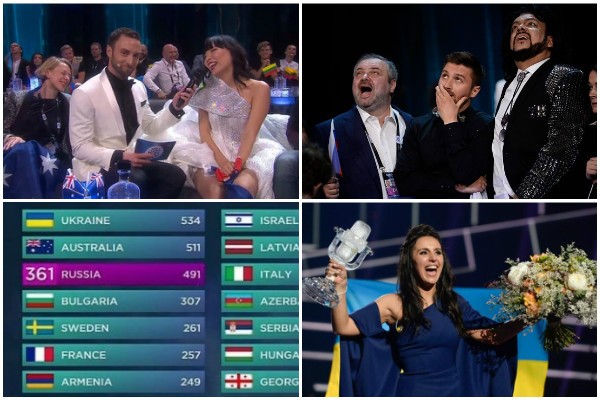We’ve already reported on the fact that Australia’s Dami Im would have won Eurovision 2016 if the Eurovision 2015 voting rules had been applied. But what happens if we turn back time and rewind to pre-2003, when only countries competing in the Grand Final could cast their votes?
In the three tables that follow, you can see what would have had happened if the pre-2003 system had been applied in Stockholm. These results are based on the actual points awarded by the 26 grand finalists, and differences from their actual voting results are indicated in brackets. As at Eurovision 2016, the tie-breaker rule is applied to all countries with the same total number of points — aka, the country with more televotes wins the tie.
Eurovision 2016: Alternative results
In this first table, the results are based on the combined scores between the 26 grand finalists. The top 4 and the bottom 2 remain unaffected, with Ukraine finishing 22 points ahead of Australia (She finished 23 points ahead of her in the actual Eurovision 2016 results). Malta sneaks into the Top 10 (jumping up from 12th), while Lithuania falls to 11th from 9th.
The biggest loser in the old system would be Douwe Bob, who falls from 12th to 18th.
Georgia’s Young Georgian Lolitaz would gain the most — moving up six places to 14th.
1. Ukraine – 329 points (No change)
2. Australia – 307 points (No change)
3. Russia – 289 points (No change)
4. Bulgaria – 195 points (No change)
5. France – 191 points (Up 1 place)
6. Armenia – 182 points (Up 1 place)
7. Poland – 154 points (Up 1 place)
8. Sweden – 141 points (Down 3 places)
9. Malta – 113 points (Up 3 places)
10. Belgium – 107 points (No change)
11. Lithuania – 105 points (Down 2 places)
12. Israel – 101 points (Up 2 places)
13. Austria – 99 points (No change)
14. Georgia – 93 points (Up 6 places)
15. Hungary – 81 points (Up 4 places)
16. Azerbaijan – 80 points (Up 1 place)
17. Latvia – 79 points (Down 2 places)
18. The Netherlands – 79 points (Down 6 places)
19. Cyprus – 61 points (Up 2 places)
20. Italy – 61 points (Down 4 places)
21. Spain – 53 points (Up 1 place)
22. United Kingdom – 33 points (Up 2 places)
23. Serbia – 29 points (Down 5 places)
24. Croatia – 26 points (Down 1 place)
25. Czech Republic – 25 points (No change)
26. Germany – 3 points (No change)
Eurovision 2016: Alternative televoting results
Of course, back in 2003 there was just televoting. Here we focus on the televote and exclude the results from all 16 eliminated semi-finalists. The top 3 remain unchanged, but Russia wins the televote by 9 points. (That’s down from the 38-point margin Sergey had in the grand final televote this year).
Once again, only Lithuania dropped out of the top 10 with Hungary taking its place.
1. Russia – 225 points (No change)
2. Ukraine – 216 points (No change)
3. Poland – 149 points (No change)
4. Bulgaria – 123 points (Up 1 place)
5. Australia – 110 points (Down 1 place)
6. Armenia – 101 points (Up 1 place)
7. France – 78 points (Up 2 places)
8. Austria – 78 points (No change)
9. Sweden – 72 points (Down 3 places)
10. Hungary – 45 points (Up 4 places)
11. Azerbaijan – 41 points (Up 1 place)
12. Lithuania – 40 points (Down 2 places)
13. Cyprus – 37 points (Up 2 places)
14. Belgium – 34 points (Up 2 places)
15. Latvia – 32 points (Down 2 places)
16. The Netherlands – 26 points (Up 1 place)
17. Georgia – 24 points (Up 3 places)
18. Serbia – 20 points (Down 7 places)
19. Malta – 16 points (Up 2 places)
20. Israel – 11 points (Up 2 places)
21. Italy – 11 points (Down 3 places)
22. Spain – 8 points (Up 2 places)
23. United Kingdom – 5 points (Up 2 places)
24. Croatia – 4 points (Down 5 places)
25. Germany – 2 points (Down 2 places)
26. Czech Republic – 0 points (No change)
Eurovision 2016: Alternative jury results
The juries weren’t brought back until 2009, so here are this year’s jury results based on the 26 grand finalists only. Unsurprisingly, Australia comfortably came out on top whilst France and Ukraine swapped places in the top 3. Georgia jumps four places to 10th, while Russia plummets 7 places down to 12. Ouch.
1. Australia – 197 points (No change)
2. France – 113 points (Up 1 place)
3. Ukraine – 113 points (Down 1 place)
4. Malta – 97 points (No change)
5. Israel – 90 points (Up 3 places)
6. Armenia – 81 points (Up 4 places)
7. Belgium – 73 points (Down 1 place)
8. Bulgaria – 72 points (Down 1 place)
9. Sweden – 69 points (No change)
10. Georgia – 69 points (Up 4 places)
11. Lithuania – 65 points (Up 1 place)
12. Russia – 64 points (Down 7 places)
13. The Netherlands – 53 points (Down 2 places)
14. Italy – 50 points (Down 1 place)
15. Latvia – 47 points (No change)
16. Spain – 45 points (No change)
17. Azerbaijan – 39 points (Up 2 places)
18. Hungary – 36 points (No change)
19. United Kingdom – 28 points (Down 2 places)
20. Czech Republic – 25 points (Up 1 place)
21. Cyprus – 24 points (Down 1 place)
22. Croatia – 22 points (No change)
23. Austria – 21 points (Up 1 place)
24. Serbia – 9 points (Down 1 place)
25. Poland – 5 points (No change)
26. Germany – 1 points (No change)











Year after year, jury irregularities are revealed. They shouldn’t screw up ESC any more. Juries must be scrapped.
@AberSam
You have it here : http://img15.hostingpics.net/pics/351730Analyseeurovision1.jpg
http://forum.eurovision-fr.net/index.php?topic=14845.180
@Stan
“they didn’t mark down a possible winner, they judged the song”
Yep, especially the jury from Lithuania. Pretty much all of them. Second year straight.
Would be interesting to see what the pre-2013 system, where only the juries and peoples top ten were counted when working out each countries vote. That might change a few things.
Someone should calculate the difference where countries (such as San Marino) were given a fake jury/televote due to lack of televotes etc. btw which countries had jury/televote issues and had a fabricated score for that part?
@Colin
Two major problems with your idea.
1. It would render low population countries like san marino and moldova utterly worthless, and make high population countries like russia the determining factor.
2. Since you cant vote for your own country, it screws big countries over completely. 30,000 people would be ineligible to vote for San Marino. 144million barred from voting for russia
@Maria True that, but now it’s the other way around. For example, 40 votes in Malta can mean 2 points, while in Germany even 400 can be dismissed as if nobody called. Unfortunately, vote count would be diminished that way. On the other hand, small countries would have upper hand in points for their entries. Think: if (for example) 203,538 votes cannot be given to France, while only 3,401 votes cannot be given to Montenegro, then Montenegro has the upper hand of collecting more foreign votes. I guess it’s not fair either way, but the new system would bring something… Read more »
@Zoomy
Yes you are absolutely right in your observation!! Oh my god…
100% televote, only countries participate in Grand Final – this results are interesting. Even system promotes other country.
@Colin That would make larger countries’ opinions have a much bigger weight and it would probably alienate smaller coutries from the contest. Entries might also start pandering to certain audiences, in the largest countries which have the most viewers
Manupulating with the jury votes is clear.
Thank you broadcasters
@Colin
That’s a very good idea indeed!
I have a suggestion for different televote rules. Much like Icelandic and Norwegian national finals, what if EVERY vote counted. Instead of Poland giving 12 points to Italy, it would say, Poland gave 58, 964 votes to Italy. That way, every vote would count and results would probably be different. I guess I wouldn’t have much impact on the very top, but it might rearrange qualifiers. For example, certain entry would score high if 5 countries with most diaspora, but would maybe be rock bottom elsewhere. Also, an entry might be 11’th – 12’th in most countries and by 1-12… Read more »
No Zoomy, they didn’t mark down a possible winner, they judged the song… Don’t be so paranoid, the song wasn’t the best. It was more a kind of soundtrack for the staging.
LMAO
There are.people so Pavlovian conditioned to whine about Sweden for everything.
You could say every country but Sweden starts with 50 free points and theyd say it favored the Swedes
This is a system changed by Sweden to favour Sweden.
What about the qualifiers under previous systems? Would we have seen the same ones in the final?
The third one shows that the jury of countries that qualified from the semi-finals voted AGAINST Russia considering Lazarev the most possible winner, while the countries not involved in the final awarded him the second place. Juries from 25 countries in the final gave him 64 points (average point 2.56) and juries from 15 countries not qualified gave him 66 points (average point 4.4)
Excellent work. Its always interesting to see different interpretations of the scoring. Kind of fun this year too because, depending on how you lean, you get one of three different winners.
Just so long as people don’t use it as an excuse to debunk the REAL results. Under 2016 rules, Ukraine won. No denying that.